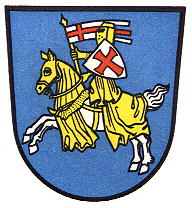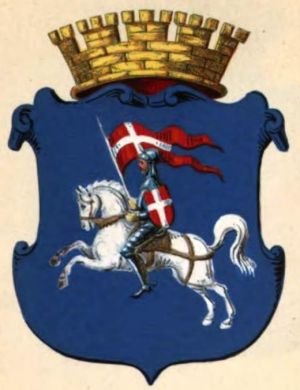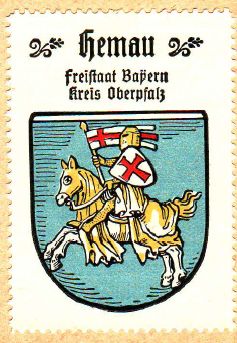Hemau: Difference between revisions
Knorrepoes (talk | contribs) m (Text replacement - "|'''English''' ↵| {{blazon wanted}}" to "|'''English''' | blazon wanted") |
Knorrepoes (talk | contribs) m (Text replacement - "{{de1}}" to "{{de}}") |
||
| Line 31: | Line 31: | ||
{{ | {{de}} | ||
{{media1}} | {{media1}} | ||
Revision as of 08:32, 25 July 2023
HEMAU
State : Bayern
District (Kreis) : Regensburg (until 1973 Parsberg)
Additions : 1972 Berletzhof, Kollersried, Neukirchen, Pellndorf, Thonlohe; 1978 Aichkirchen, Haag (partly), Hohenschambach, Klingen, Langenkreith, Laufenthal (partly; 1894 Beilnstein)
| German |
In Blau der golden gerüstete heilige Georg mit goldenem Topfhelm auf einem mit goldener Decke (Pferdemantel) geschützten weißen Rosse mit der Fahnenlanze (silbernes Tuch mit rotem Kreuze) und dem silbernen, mit rotem Kreuz gezierten Armschild rechtshin sprengend. |
| English | blazon wanted |
Origin/meaning
The arms show St. George, dressed as a knight and, unusually, not with the dragon. St. George was the patron saint of the Benedictine Abbey of Prüfening, to which the parish Hemau belonged until 1803.
The arms have been used since the early 14th century, as the oldest seal (known since 1324) already shows the knight. All later seals and images show the knight, but the shape and colours have changed regularly. The present colours are known since 1609.
| The arms by Tyroff (1835) |
The arms by Hupp in the Kaffee Hag albums +/- 1925 |
This page is part of the German heraldry portal Deutsche Wappensammlung |
Heraldry of the World |
|
German heraldry:
|
Selected collector's items from Germany:
|
Literature: Stadler, 1964-1971, 8 volumes; Hupp, O: Kaffee Hag albums, 1920s




